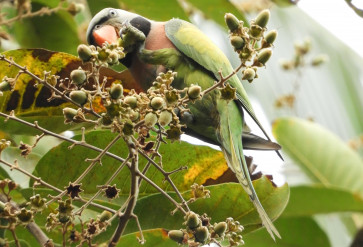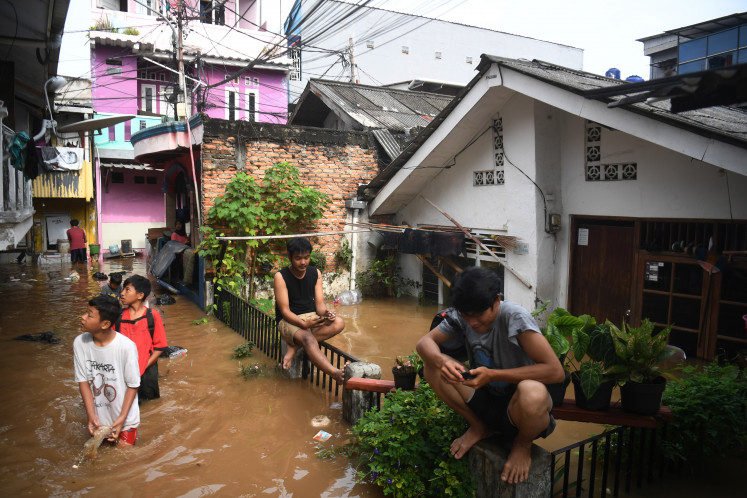Popular Reads
Top Results
Can't find what you're looking for?
View all search resultsPopular Reads
Top Results
Can't find what you're looking for?
View all search resultsNew accord to help curb illegal fishing
After almost a decade of waiting, Indonesia and more than 30 countries are embarking on a joint combat against the illegal, unreported and unregulated (IUU) fishing that robs them of billions of dollars a year
Change text size
Gift Premium Articles
to Anyone

A
fter almost a decade of waiting, Indonesia and more than 30 countries are embarking on a joint combat against the illegal, unreported and unregulated (IUU) fishing that robs them of billions of dollars a year.
On Monday, Indonesia was one of 34 countries celebrating the formal adoption and enforcement of the long-awaited Port State Measures Agreement as they attended a UN Food and Agriculture Organization (FAO) committee on fisheries conference in Rome.
The international joint effort aims to deter, prevent and eliminate IUU fishing, a major problem in the management of sustainable fisheries and one that has wrought havoc on the marine ecosystem.
According to the FAO’s 2014 state of the world’s fisheries report, 90 percent of the world’s fish stocks have been fully or overexploited, mainly as a result of IUU fishing.
World Bank statistics shows that ineffective fish stock management and IUU fishing waste between US$75 billion and $125 billion of global output every year.
In Indonesia, the bank report says, IUU incurs losses of about $20 billion in revenues and has particularly affected small-scale fishing communities. In the decade between 2003 and 2013, the number of Indonesian fishing households dropped to 800,000 from 1.6 million.
‘’Fishing is no longer a viable occupation. We’re losing our fishermen,’’ Maritime Affairs and Fisheries Minister Susi Pudjiastuti told the conference.
The Port State Measures Agreement, which Indonesia ratified in May this year, was initiated by some FAO member countries back in 2007 with strong backing from the US and Norway.
Conspicuously absent from the list of 34 countries ratifying the agreement are China and Japan, two of the biggest fish consumers and exporters. The two countries have often come under the spotlight for alleged illegal fishing.
Of the 10 largest fish-producing countries, only Indonesia, Thailand, Chile and the US have become party to the agreement. The other six — China, Peru, India, Japan, Vietnam and Russia — have yet to ratify it.
The accord helps parties identify IUU fishing vessels and deny them access to, or the use of, their port services. Vessel masters are required to provide information about the ship’s identifications, fish on board and operating licenses before being granted entry to the port. These measures aim to restrict and block the movement of IUU vessels into national and international markets.
The stringent procedures also allow port authorities to check on the condition of the vessel crews. This can lead to detection of any illegal practices, such as smuggling, slavery and human trafficking.
At the conference, Susi shared Indonesia’s experience in enforcing state measures, specifically the imposition of a national moratorium from November 2014 through October 2015 on all licensed fishing vessels built overseas, locally called ‘’ex-foreign vessels’’.
Initially, the vessels were flagged under another state before being registered for operations in Indonesia. In the course of the moratorium, over 1,000 such vessels were audited for identification and compliance.
The auditors were flabbergasted by their findings. The operational license of many of the vessels had been duplicated five, seven, even 10 times. Not only that, the vessels had also been used for other, non-fisheries crimes.
‘’We have learned from experience that it’s shameful to talk about global food security without mentioning the hard facts about the use of unsustainable fishing equipment, human trafficking, modern slavery and smuggling of goods, drugs and endangered species committed in the course of IUU activities,’’ Susi said.
For more effective implementation of the agreement, Indonesia strongly supports the FAO’s Global Record of Fishing Vessels initiative.
‘’IUU fishing crimes are not just Indonesia’s problem, or Asia’s, or Africa’s, or any other particular country’s — rather, it has become the world’s problem, because let me remind you: We all have one world, one ocean to protect.”
____________________________________
To receive comprehensive and earlier access to The Jakarta Post print edition, please subscribe to our epaper through iOS' iTunes, Android's Google Play, Blackberry World or Microsoft's Windows Store. Subscription includes free daily editions of The Nation, The Star Malaysia, the Philippine Daily Inquirer and Asia News.
For print subscription, please contact our call center at (+6221) 5360014 or subscription@thejakartapost.com









